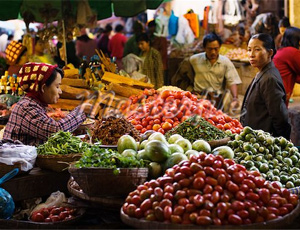Myanmar Set to Open Up to Foreign Investment
 Mar. 28 – The Myanmar government is introducing a new set of regulations expected to promote foreign direct investment into the country. Coupled with the lifting of U.S. sanctions on the existing regime, this move may well spell the beginning of a new chapter in the nation’s development. Long a pariah state and run until recently as an oppressive military dictatorship, a shift in domestic policy appears to be opening up the country to reform.
Mar. 28 – The Myanmar government is introducing a new set of regulations expected to promote foreign direct investment into the country. Coupled with the lifting of U.S. sanctions on the existing regime, this move may well spell the beginning of a new chapter in the nation’s development. Long a pariah state and run until recently as an oppressive military dictatorship, a shift in domestic policy appears to be opening up the country to reform.
New regulations are set to be introduced as early as next month, taking the shape of tax holidays, simplifying foreign exchange, liberalizing the banking sector and reforming the areas of investment available for foreign participation.
An increase in FDI depends to a large degree upon the success of next month’s Parliamentary elections, which Aung San Suu Kyi is taking part in for the first time since she was placed on house arrest following the 1990 general election. A champion of democracy, she has long campaigned for the opening up of Myanmar to political reform, culminating in a shift of emphasis in government from the military to a parliamentary system last year. Next month’s by-election will test how transparent this process is likely to be in the cold hard light of day. If successful, these new regulations are expected to be passed into law.
However, infrastructure – largely unchanged and in many instances even more decrepit than when the British left 60 years ago – remains a concern, as do the country’s weak legal structure and decades of neglect. Foreign investors in the country will need for some time to be experienced in dealing with backward regimes with corruption and massive inefficiencies.
To balance that, however, other polices are earmarked that could alleviate some of the problems: tax holidays of up to 100 percent for five years, a relaxing on the ban on foreign labor, foreign investment into distribution networks, and the ability to repatriate 100 percent of profits earned are all mooted changes.
The country is a member of the Association of Southeast Asian Nations, and through its membership of this trade bloc the country has access to other ASEAN markets. Other members include Brunei, Cambodia, Indonesia, Lao, Malaysia, the Philippines, Singapore, Thailand and Vietnam, while ASEAN also has double tax agreements with China and India. The entire ASEAN bloc is set to establish a free trade zone area with much of Asia, including Japan and Australia by 2013.
“It remains the very early days in Myanmar, although we watch this market with keen interest,” comments Chris Devonshire-Ellis, founding partner of Dezan Shira & Associates. “A key trigger that reforms are serious and transparent will occur should Burmese state-owned companies begin to list on stock exchanges in either Bangkok or Singapore. That may be a few years off, however the developments and potential for Myanmar are exciting and the future for the nation at this juncture looks most promising.”
Myanmar Fast Facts
- Head of State: Senior General Than Shwe
- Head of Government: Prime Minister General Thein Sein
- Capital: Nay Pyi Taw
- Largest City: Yangon
- Land Area: 676,577 square kilometers
- Population: 60,280,000
- Language: Myanmar
- Currency: Myanmar Kyat
- GDP (2011 estimate, PPP): $81.55 billion
- Previous Article
- Next Article China, India and Thailand Fastest Growing Markets for LDC Nations









